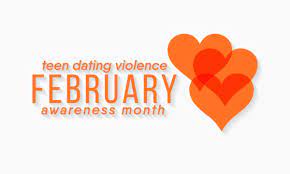Valentine’s Day is right around the corner, the day marked by grandiose expressions of LOVE! Everything from cute cards to decadent boxes of chocolate (THANK YOU, GODIVA), breathtaking bouquets to beautiful candlelit dinners. February is the month known for dreamy romance.
On the other hand, there is a lesser-known observance in February that’s not all roses and romance. Unlike Valentine’s Day, it often goes unnoticed. Yet every year, organizations and committed young people do their best to bring awareness to a topic that affects our communities:

Teen Dating Violence Awareness
Every February, National Teen Dating Violence Awareness & Prevention Month is observed, declared by Congress in 2010. The focus of the month is education and advocacy. The goal is to make people aware of the issue and to equip us with tools to keep our kids and others safe.
When I first started working with an organization as part of their prevention team, I was unaware of the severity of this issue. The statistics show 1 out of 3 teenagers knows a peer or friend who has experienced violent action by their partner. This abuse is often happening in the family home of one of the dating partners.
1 in 10 teens will experience dating violence.
Also, let’s clarify. The ages covered in some of these statistics start before they are teenagers. Some of this behavior is being seen in children as young as 11. This is why having conversations is so important. This year’s theme for Teen Dating Violence Awareness Month is Talk About It.
As parents, hard conversations come with the job. It’s important to start talking to your children early; you don’t have to wait until they are teens. Many organizations believe that parents play a key role in prevention. Having these discussions at home can make all the difference.
What to Discuss Before Kids Start Dating
 Children need to know what a healthy relationship looks like. Even before dating you can start to help your child recognize the difference. Friendships are the precursors to romantic relationships. Teachable moments are not hard to find. You can even find them in your own home.
Children need to know what a healthy relationship looks like. Even before dating you can start to help your child recognize the difference. Friendships are the precursors to romantic relationships. Teachable moments are not hard to find. You can even find them in your own home.
Because healthy relationships lead to the best romances.
If you have more than one child, every day there is an opportunity to teach how to navigate disagreements in a healthy way. That and strong communication skills are important for any kind of relationship. Utilize these opportunities to really discuss expectations and boundaries. It doesn’t always have to be a sermon, but you have your children’s attention, so take advantage of those times.
Close To Home
Last summer my son had one of those moments. There were two boys who lived on our block. My son kept referring to both of them as his friends. The more we heard, the more we realized one of the boys was not a friend. He wanted to play only when my son had a cool toy, or if the other little boy wasn’t around. Also, he would make it clear that he wanted my son to go away—he wanted the other little boy all to himself. He was mean and used his words as weapons. My son often felt torn between wanting to have this boy as his friend and the hurt feelings that seemed to go along with every encounter.
First, we tried to gently bring up some of our concerns to our son. Our hope was that he would decide not to play with him. But he continued to put himself in the position of being hurt. We wanted to forbid him from playing with the boy. More than that, we wanted him to see for himself it was not a good situation. At some point, we were able to offer up a comparison to other friends who never made him feel bad. When we spotlighted his real friends, he was able to see the difference.
I think the most important part of our conversation was giving our son permission to not stay where he was being mistreated or hurt. This translates to the later years. Children need to know they don’t have to stay in a situation that feels bad. They need to feel empowered to make hard decisions.
Mean Girls
 This is another dynamic that has to be discussed. And many of us have seen this start in girls at very young ages. Being in social circles with mean girls can desensitize kids to bad behavior. Talking to young girls about this topic is so important.
This is another dynamic that has to be discussed. And many of us have seen this start in girls at very young ages. Being in social circles with mean girls can desensitize kids to bad behavior. Talking to young girls about this topic is so important.
{Read More: Yes, You Should Be Your Kid’s Friend :: 10 Ways to Bond with Tweens}

Some of the effects of mean girl behavior are mirror images of red flags for teen dating violence and domestic violence. Girls who are overly bossy, like to form clubs and exclude others, keep or tell lots of secrets, and say things under the guise of “just joking” are things to watch out for.
These kinds of relationships lay the foundation for many girls. It’s important to teach our girls that mean girl behavior is not ok. Being assertive and willing to stand up for what is right is very important. And so is standing up for others.
Remember This
The pattern of behavior in any abusive relationship is about power and control. And unhealthy relationships in teenagers often lead to unhealthy relationships in adulthood. It can also lead to other problematic behaviors like depression, drinking, and suicide.
The acronym MICE can help you to remember what to look out for when you are examining your child’s or teen’s relationships.
Manipulation
Isolation
Control
Extreme Jealousy
If mice are in the room, respect is not.
Not Just Today
Most of us love a good love story. But being in love in a movie is very different from real life. Understanding the foundation of healthy relationships is important to teach our children, especially our teens, as they start to navigate the waters of dating and romance.
February 14 is just one day. Romance is just one ingredient. When you boil it all down, “Love is Respect” is the standard we should all have no matter what kind of relationship we are in. So let’s help spread the word this February. Maybe it can even add a little more meaning to your celebrations of love this year.













